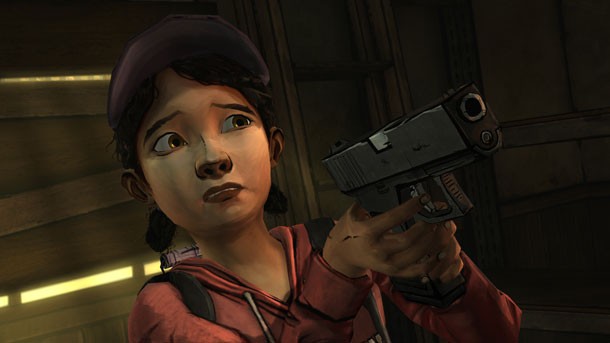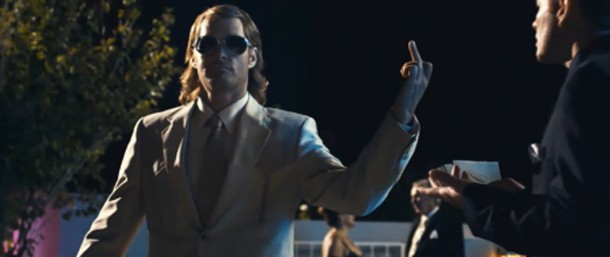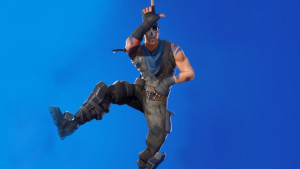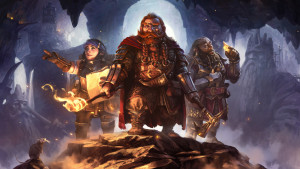Please support Game Informer. Print magazine subscriptions are less than $2 per issue
Versus Mode – Debating The Walking Dead

Versus Mode is a special feature that we're doing today, and it focuses on two editors debating the merits of a particular game or series. This entry features executive editor Andrew Reiner debating The Walking Dead series with senior associate editor Dan Ryckert.
Reiner: When I first saw Telltale Games’ The Walking Dead, I told myself I wasn’t going to play it. My reasoning? It looked just like Jurassic Park, the company’s most recent release at the time, and an experience loaded to the hilt with atrocious quick time events and a level of excitement that rarely rises above that scene where Laura Dern studies Triceratops droppings. After playing that game, I thought Telltale lost its way in the adventure genre.
But then the rave reviews for Walking Dead’s first episode started rolling in. Game Informer’s Kimberly Wallace told me that I had to play it, and we had to discuss it immediately.
I downloaded it that night and played through the first chapter. I was somewhat speechless afterwards. It seemed like Telltale said “Okay, we’ll put all of our good ideas into Walking Dead, and all of our bad ideas into Jurassic Park.” The developer learned from its mistakes, and found a formula that not only worked for The Walking Dead license, but moved the adventure genre forward into new territory; almost a new “drama” genre.
I still find the first few minutes in the game – where Lee is riding in the back of a police car – to be fascinating and unlike anything else out there. If you don’t remember this moment, it’s where Lee is conversing with a police office, and you – the player – are telling Lee what to say, yet you have no knowledge of his past, and are pushed to fabricate a story. What did you think of that scene in particular, Dan?
Dan: You bring up the comparison to Jurassic Park, but I don’t see much of a difference between the two. I know the “it doesn’t feel like a game” argument gets tossed around a lot, but that’s honestly how I feel about it. I had an entirely different reaction to the scene in the police car that you referred to, which felt just like every other scene past that. I felt like I was in a slow-moving “choose your own adventure” book, and I think books are already boring.
Like a lot of people, I grew up on Mario, Zelda, and a wide variety of fast-paced platformers and action games that require dexterity. I’m not narrow-minded enough to think that games have to test your reflexes in order to be a “game,” but I want to feel like I’m doing something. I love narrative-heavy games like The Last of Us, Metal Gear Solid, and Bioshock because they tell a fascinating story while simultaneously challenging me and making me feel like I have some level of control over the action. With The Walking Dead, I just felt like I was taking a multiple choice standardized test while I watched a generic zombie story play out on my TV screen.
Reiner: I agree 100 percent that the game often gets caught up in its narrative, but I think that’s a good thing. I don’t think every game has to be action, action, action. A solid story that the player has a hand in can be just as rewarding as a game where you never let off of the attack button. Does that push the definition of what we call a “game”? For sure. I think Walking Dead is more of an interactive drama than a traditional adventure game, and that’s perfectly fine. In fact, I'm a big fan of the format. Telltale has crafted a new gaming experience that opens the door for more story-driven experiences.
Dan: I don’t require “action, action, action,” either. I’m fine with a slower pace, and I love exploring interesting game worlds without needing to shoot someone in the face every five seconds. The thing is, The Walking Dead isn’t an interesting game world to me. I don’t like zombie crap to begin with, unless it does something particularly fun with it (I had a great time with Dead Rising 3, for instance). Everything about The Walking Dead seems generic to me from a narrative perspective, and I don’t see what makes its world any more original than any of the 8,000 zombie stories that came before it. Then again, I only played the first episode of the season one because I got bored and realized the game was stupid.
Reiner: Yes, The Walking Dead’s take on zombies falls in line with most other zombie stories. I guess I’d call it a classic zombie tale. The point of interest isn’t with the zombies, however. It’s with the people and the relationships in the world. I think Telltale gets that across early on – in that police car sequence I mentioned, and in the subsequent moments with Lee exploring an abandoned house. The uncertainty of Lee’s past made that first interaction with Clementine fairly uncomfortable for me. I wanted to help her find her parents, or at least get her to safety, but didn’t know if Lee should be trusted or not. Why was he in the police car? I remember thinking he could be the worst person alive. This is The Walking Dead, after all. Robert Kirkman, the creator of the comics, pulls no punches in his stories. He's a real George R. R. Martin with his characters. I didn’t want to trust Lee early on, but I was kind of forced to do so without knowing who he really was or what he was capable of. I thought that was a brilliant narrative twist. Did you find Lee's relationship with Clem interesting?
Dan: Nope. Didn’t find anything interesting about anything I played. I just don’t find anything interesting about the zombie genre as a whole, and this certainly didn’t change my opinion. I’m open-minded if it does something different. For example, Shaun of the Dead was a genuinely hilarious movie that pokes fun at the genre in a loving way, and I thought it worked perfectly. The infected in The Last of Us are basically zombies, but it was done in a unique way and I was fascinated for the entire experience. The Walking Dead didn’t do anything at all that I thought was new or interesting in any way. What does Lee offer as a protagonist that Joel doesn’t do a million times better? What about Clementine vs. Ellie? These seem like similar character pairings to me, but The Last of Us was so much more nuanced than anything in The Walking Dead. Also, it’s a super fun video game, which The Walking Dead absolutely is not.
Reiner: It sounds to me that you won’t like a zombie game unless the undead are unique – with bat wings and shooting acid from their breasts. The Walking Dead could offer that, but that’s not what the game is about. It’s about the people. The survivors. Banding together and finding a way of life in this crazy, post-apocalyptic world. Clementine and Ellie are entirely different characters. Ellie, when you meet her, is already adjusted to life in the world infested with cabbage patch enemies. Clem is almost the exact opposite. She's hiding in her tree house, terrified to leave it. Helping her adjust is a big part of the game. You are her guide. She’s counting on you, yet you can’t count on yourself since you don’t know who you are exactly. It’s a fascinating yarn relationship to watch develop. Telltale does a fantastic job with it, too, making it one of the most engaging zombie stories I’ve come across. It has heart, intensity, and it made me count the days until the next chapter released. I’m not shortchanging The Last of Us at all, mind you. That game was brilliant for very different reasons. I just think that you missed the entire point of The Walking Dead. It’s a character game, not a zombie game.
Dan: Let me immediately refute the first point you made there with some direct examples. Dead Rising 3. Resident Evil. Left 4 Dead. House of the Dead. Plants vs. Zombies. The zombies DLC in Borderlands and Red Dead Redemption. What do those all have in common? Normal-ass zombies. Also, I liked all of those games! I certainly am not disqualifying The Walking Dead because it has standard zombies, because I’ve clearly enjoyed games with them in the past. Everyone talks about how The Walking Dead is about the characters, but it definitely didn’t make me feel for them in the first episode. I got in a car crash and then spent like thirty minutes trying to find Nutrigrain bars in a pharmacy. Brilliant writing.
Reiner: The first episode was only an hour long. If you spent a half hour looking for something in a pharmacy, you entire playthrough of that episode would probably be Skyrim length. And I think the writing is top notch. They know how to draw your attention and plant seeds for later reveals. The level of trust that Telltale places onto character-based choices is done one of my favorite parts. An answer you thought would help a character could lead to disaster, or another character turning on you. And they often don't give you time to think about them. Some choices are timed – like you only have a split-second to react in a tense situation. What did you think of the combat and gameplay? Yes, both are infrequent, but I thought that the combat encounters were usually intense and did a great job of replicating that feeling of wanting to free yourself from a zombie by kicking or punching your way to safety.
Dan: Oh cool, timed encounters? You know what? If you don’t jump in time at the beginning of Super Mario Bros., that Goomba is gonna hit you! If you don’t shoot your shotgun in time in Doom, that big pink thing is gonna kill you! Are you really touting “timed encounters” as a reason that this game isn’t a big turd?
Reiner: I thought they fit the experience. Telltale turned most of them into events that would rattle the cage of the party and pull the narrative in a new direction. Yes, I generally don’t enjoy quick time events if they are overdone in a game, but Telltale uses them sparingly. I thought they were quite good.
Dan: Nope.
Reiner: Is your problem more with the game Telltale has constructed? Are you playing Wolf Among Us?
Dan: F-- no I’m not playing that. I’ve never once enjoyed a Telltale game, and unless they finally make some kind of departure from their terrible format, I don’t see that changing. I love Game of Thrones and Borderlands, but I have zero interest in their games based on them.
Reiner: It doesn’t seem like you’re willing to give another Telltale game a chance, and hey, I wouldn’t either if I didn’t enjoy their formula. That said, you are missing out on a great story in The Walking Dead. It really begs the question of what you would do for the people you care about, and pushes you to make difficult choices in extreme circumstances. Emotion runs high throughout the entire first season.
Dan:











